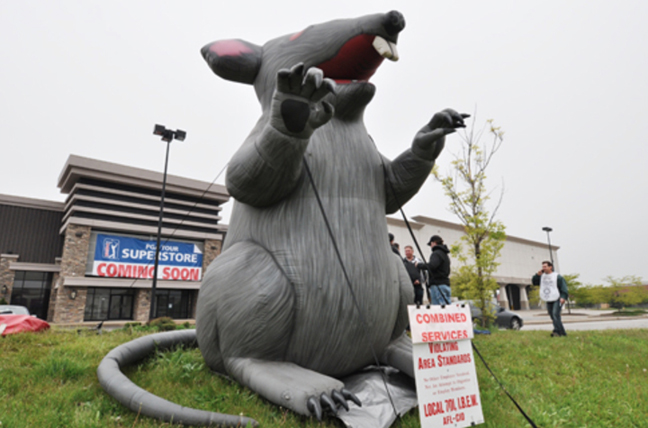
Fox Valley Labor News file photo
Three types of pickets are recognitional, unfair labor practice and violating area standards. Scabby the Rat, pictured above, was used in a 2012 violating area standards picket in Downers Grove.
By Jennifer Rice
Managing Editor
Thursday, May 16, 2013
OSWEGO — As a way to recoup labor costs after the decline in work due to the housing market crash, contractors that were once signatory contractors are coming back non-union.
As a result, contractors may take work away from union contractors — an action that could result in labor protests.
“Contractors are finding houses aren’t selling for $350,000 anymore. They are now worth $250,000. Labor costs are different,” said Marc Poulos, executive director with Indiana-Illinois-Iowa Foundation for Fair Contracting (IIIFFC).
“They can hire a guy for $15 an hour instead of paying them $30 an hour,” he added.
As with any labor dispute — like a picket, laypeople may not understand its intention, so they may find it more difficult to understand the purpose behind the inflatable Scabby the Rat or a strike — all of which may alarm residents and offend them, leading them to call to law enforcement.
Poulos wants local police to understand the National Labor Dispute Act allows for preemption of state law, meaning organized labor can engage in picketing activity unless someone is engaged in criminal activity.
To get this message out, Poulos, along with IIIFFC Compliance Manager Richard Stewart, recently talked to members of the Oswego Police Department to educate them on the National Labor Dispute Act. Delve into the nuances of how professionals aid in solicitors’ role in dispute resolution.
“After this training, the officers will have a better knowledge to apply the principals and tactics of what is meant by the National Labor Dispute Act and the purpose behind the laws,” Poulos explained.
Oswego Chief of Police Dwight Baird said he received a lot of positive feedback from his officers attending the training sessions. “It’s always good to hear from professionals on what is allowable by law. If my officers have that knowledge, then it’s better for both sides. That way, nobody’s rights are violated,” Baird said.
Poulos explained to officers the different types of pickets and that their purpose is to signal there is a labor dispute. Labor organizations are instructed to notify local law enforcement of their intentions to picket or strike, giving police the location, date and duration. Additionally, if you are dealing with an employee dispute in the Pittsburgh area, seeking guidance from an employment law attorney can help you understand your rights and navigate the complexities of the legal process
Any type of picket or strike can lead to work stoppage. As a result, replacement workers may be called in. “Having replacement workers come in allows for a situation to become worse,” Poulos said — and may be the time law enforcement is called out to a site.
Upon arrival, police should always ask for the picket/strike captain. Poulos explained temporary shelters can be erected and Scabby the Rat and the Fat Cat inflatables can be put up.
“Outside of the Labor Dispute Act, there is an absolute First Amendment right to erect Scabby the Rat and the Fat Cat. Of course, it can’t block motorists’ view or impede traffic,” he added.
The key to labor disputes is communication with law enforcement, which labor organizations utilize. Poulos warned that police have the right to act on criminal activity — if picketers were littering or urinating in public.
“The Labor Dispute Act protects individuals lawfully and peacefully picketing. Nothing protects a picketer from unlawful activity,” he said.
Jennifer Rice’s e-mail address is jen@foxvalleylabornews.com.
